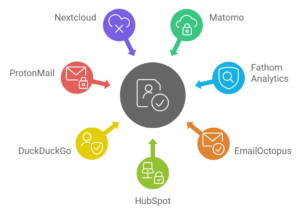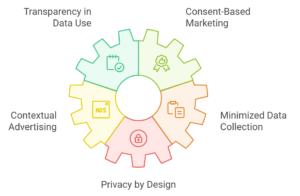People browsing the Internet today value privacy. As marketers, we need to respect that while still creating effective campaigns. So, how can we use tools that prioritize privacy without sacrificing our marketing goals?
Why privacy-focused tools are essential
People are increasingly concerned about how their personal information is collected and used. Trust has become a crucial factor, with scandals involving data misuse making headlines. Laws like the General Data Protection Regulation (GDPR) in Europe (learn about GDPR) and the California Consumer Privacy Act (CCPA) in the U.S. (understand CCPA) have changed the rules. Consumers now expect transparency and control over their data. Using privacy-focused tools isn’t just about following the law but building trust. Customers who know we respect their privacy are more likely to engage with us. Plus, with browsers blocking third-party cookies and limiting tracking, these tools help us stay effective.
Top privacy-focused marketing tools

Let’s explore some tools that put privacy first and help us connect with our audience respectfully.
1. Matomo: own your analytics
Matomo is an open-source analytics platform that can replace Google Analytics. Unlike other analytics tools, Matomo lets you host data on your own server, giving you full control.
- Key features:
- Complete data ownership with self-hosting.
- No data sampling, ensuring accurate insights.
- Compliant with GDPR and other privacy laws.
- Offers heatmaps and session recordings without compromising privacy.
By using Matomo, you can analyze your website traffic without sharing data with third parties. This control means you can customize data collection to suit your privacy policies. Learn more at matomo.org.
2. Fathom Analytics: simple and privacy-friendly
Fathom Analytics offers straightforward website analytics without collecting personal data.
- Key features:
- No cookies or personal data tracking.
- Easy setup with a clean dashboard.
- Bypasses ad blockers, so you get complete data.
- Provides real-time analytics.
Fathom helps you understand your website’s performance while respecting user privacy. It’s designed for simplicity, giving you the insights you need without the complexity. Check it out at usefathom.com.
3. EmailOctopus: consent-based email marketing
EmailOctopus provides a platform for email campaigns that emphasize user consent and compliance.
- Key features:
- Tools for managing double opt-in subscriptions.
- Simple unsubscribe options.
- Affordable pricing for businesses of all sizes.
- Integrates with platforms like Zapier and Shopify.
EmailOctopus helps you build an engaged and trusting email list by focusing on consent. By reaching people who want to hear from you, you’ll improve open rates and conversions. Visit emailoctopus.com for more information.
4. HubSpot’s privacy features
HubSpot offers a suite of marketing tools with built-in privacy options.
- Key features:
- Consent tracking to manage user permissions.
- Customizable cookie notices.
- Tools to ensure GDPR compliance in forms and contacts.
- Encrypted data storage for security.
HubSpot helps you stay compliant while delivering personalized experiences. Its platform centralizes your marketing efforts, making it easier to manage privacy across channels. Learn more at HubSpot’s GDPR overview.
5. DuckDuckGo: advertise without tracking
DuckDuckGo isn’t just a privacy-focused search engine—it also offers advertising options that don’t track users.
- Key features:
- Contextual ads based on search queries.
- No personal data collection, aligning with privacy expectations.
- Reach an audience that values privacy.
- Simple advertising model.
Consider advertising on DuckDuckGo to connect with users who care about their privacy. This audience is often tech-savvy and appreciates brands that respect their data. Learn more at DuckDuckGo advertising.
6. ProtonMail: secure email communication
ProtonMail offers end-to-end encrypted email services, ensuring that your communications are secure.
- Key features:
- Encrypted emails that even ProtonMail can’t read.
- Open-source cryptography.
- Based in Switzerland, it is protected by strict privacy laws.
- Easy-to-use interface.
Using ProtonMail for sensitive communications shows your commitment to privacy. It’s especially useful if you handle confidential information. Explore more at protonmail.com.
7. Nextcloud: private collaboration tools
Nextcloud provides a self-hosted collaboration platform, including file sharing and communication tools.
- Key features:
- Full data ownership and control.
- Secure file sharing with clients and team members.
- Plugins for additional functionality like calendars and video calls.
- Compliant with GDPR and HIPAA.
Nextcloud is ideal for collaborating on projects while keeping data within your own servers. Learn more at nextcloud.com.
Techniques for privacy-focused marketing

Tools are only part of the solution. Adopting privacy-friendly techniques enhances trust and effectiveness.
Be transparent about data use.
Clarity builds confidence.
- Use simple language in privacy policies.
- Provide easy ways for users to manage their preferences.
- Keep users informed about any changes in data practices.
For example, instead of legal jargon, explain: “We collect your email to send you updates about our products. You can unsubscribe anytime with one click.”
Focus on consent-based marketing
Consent is crucial for respecting privacy.
- Implement double opt-in for email sign-ups.
- Let users choose what types of communications they receive.
- Honour unsubscribe requests promptly.
By giving control to users, you build a more engaged audience.
Embrace contextual advertising
With less ability to track users, contextual advertising gains importance.
- Place ads relevant to the content being viewed.
- Avoid relying on personal browsing history.
- Enhance user experience without invading privacy.
For instance, advertising hiking gear on an outdoor blog reaches interested readers without needing personal data.
Minimize data collection
Collect only what you need.
- Reduce data collection to essential information.
- Limit how long you store data.
- Securely delete data that’s no longer necessary.
This practice builds trust and reduces the risk of data breaches.
Implement privacy by design
Make privacy a fundamental part of your processes.
- Incorporate privacy at every stage of campaign planning.
- Regularly review and update privacy measures.
- Train your team on privacy best practices.
Making privacy a core value becomes a natural part of your marketing.
What if we ignore privacy?
Imagine sticking to old habits without adjusting for privacy concerns. We risk legal penalties and damage to our reputation. Customers may lose trust, leading to decreased engagement and sales. In severe cases, violations of GDPR can result in fines up to €20 million or 4% of annual global turnover, whichever is higher. Adapting now positions us as leaders in ethical marketing. We not only avoid penalties but also differentiate ourselves from competitors.
What if we embrace privacy?
On the other hand, embracing privacy can create new opportunities. Customers are more likely to support brands they trust. According to a Pew Research Center study, 79% of adults are concerned about how companies use their data (read the study).By prioritizing privacy:
- We build stronger relationships with our audience.
- We improve customer loyalty.
- We open doors to new markets that value privacy.
Expert insight: privacy is good for business
I spoke with Lisa Thompson, a digital privacy advocate and marketing consultant. She shared: “Companies that prioritize privacy comply with laws and build stronger relationships with their customers. In today’s market, that trust can set you apart from competitors. Privacy isn’t a hurdle; it’s an opportunity.”Her words highlight that embracing privacy isn’t just ethical—it’s smart business.
Final thoughts
Privacy isn’t a trend—it’s a fundamental expectation from our audience. By using privacy-focused tools and techniques, we build trust and connect more effectively. We respect our customers, and they reward us with their loyalty. Now is the time to adapt. By prioritizing privacy, we comply with laws and create more meaningful marketing campaigns. Let’s lead the way in ethical marketing.
